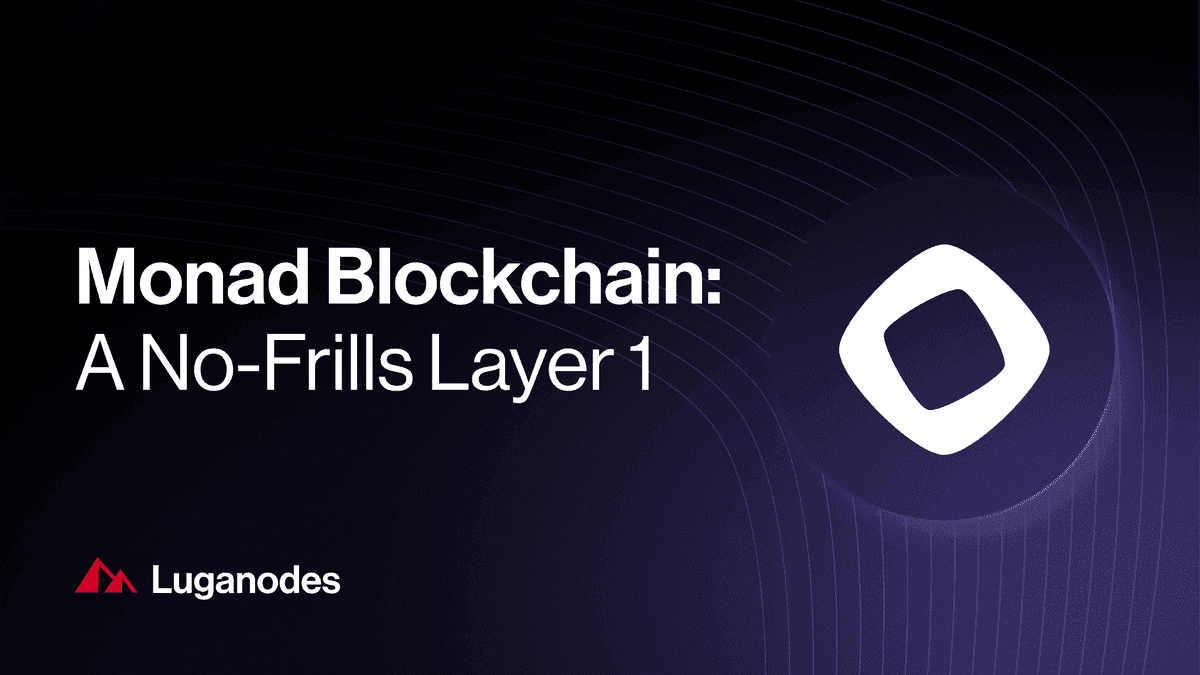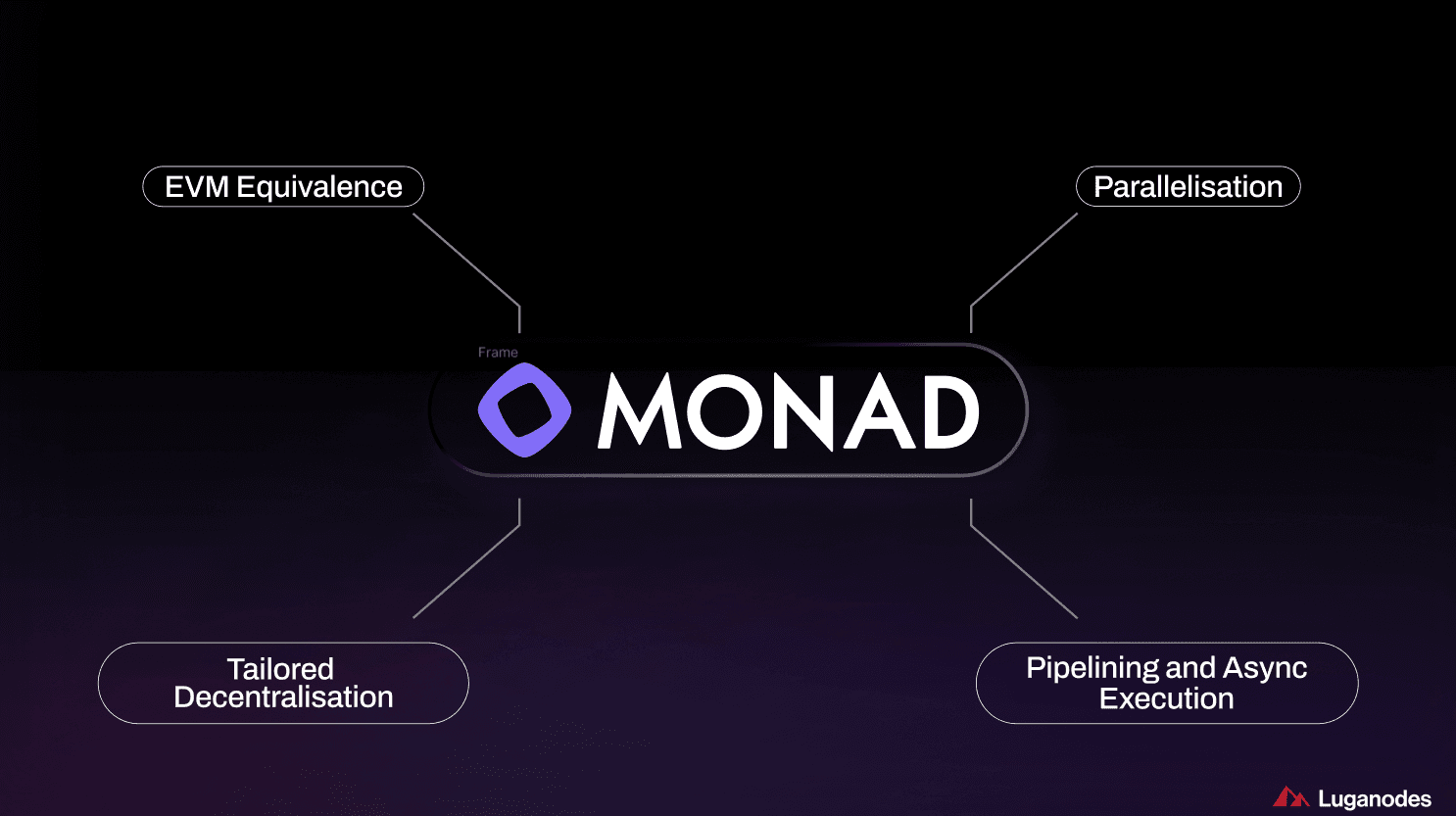5 min read
Monad Blockchain: A No-Frills Layer 1
Speeding up and Scaling the EVM

Introduction
Ethereum has a captivating hold in terms of influence, innovation, and market trust. Since launching in 2015, the network has been the centerpiece of smart contract innovation, has been home to most of the explosion in Total Value Locked (TVL) post-DeFi summer, and has successfully transitioned to Proof-of-Stake and a rollup-centric roadmap.
But Ethereum scaling research is multifaceted, and Monad is focused on an entirely different approach to Ethereum scaling - efficiency of execution. With origins in high-frequency trading, the Monad blockchain introduces superscalar pipelining and parallel execution to the Ethereum Virtual Machine.
The Origins
Monad Labs, a pioneering blockchain venture, emerged on the scene with a strong vision and ample support, raising an impressive $19 million in funding. Established in 2022, Monad Labs introduced an Ethereum Virtual Machine (EVM)-compatible layer-1 smart contract platform, driven by the visionaries Keone Hon, Eunice Giarta, and James Hunsaker. As mentioned earlier, it has its roots in traditional finance - they have an exceptional team, boasting over seven years of invaluable experience in constructing low-latency, high-frequency trading (HFT) systems during their tenure at Jump Trading, Jump Crypto, Pattern Research, and Arista. This deep-rooted expertise promises to bring innovation and efficiency to the ever-evolving blockchain landscape.
Vision
Monad's vision is founded on a profound appreciation of the transformative potential inherent in decentralised technologies. In recent years, the merits of permissionless development environments have become increasingly evident. But in this pursuit of a decentralised future, developers have often encountered significant challenges, particularly in the realms of throughput and compute cost. Monad takes it up on itself to solve these underlying issues.
The driving force behind Monad's vision is the belief that mass user adoption is pivotal for the blockchain industry's evolution. Presently, Ethereum, a leading blockchain platform, can only support 500,000 daily users, each averaging just 2 transactions per day. To truly integrate blockchain technology into the mainstream, a solution is needed that can accommodate 100 times more users, equating to around 50 million people, while also facilitating 10 times more transactions per user. Monad positions itself as the ideal solution to realise this ambitious vision.
The Tech
In pursuit of this vision, Monad Labs has devised a comprehensive strategy. The company is developing a new layer 1 protocol designed to process an impressive 10,000 transactions per second, with 1 second blocktimes, and instant finality. This significant leap in transaction processing capacity is achieved through fundamental changes to the consensus and execution layers of the blockchain. They have concentrated on some individual issues which can have a great impact on creating a new and improved EVM.
Empowering Ethereum with Parallelization
Monad's core mission revolves around the empowerment of the Ethereum Virtual Machine by incorporating parallelization, effectively delivering both robust performance and exceptional scalability. Monad executes transactions in parallel, allowing multiple transactions to be processed simultaneously, unlike the usual linear way. Monad is also committed to preserving backward compatibility with existing applications, ensuring a seamless transition for developers and users alike.
Decentralisation Tailored to User Preferences
At the heart of Monad's innovation lies the empowering concept of allowing users to customise their preferred degree of decentralisation. This intrinsic flexibility grants users the agency to optimise their resource allocation, thereby enriching scalability and fortifying the economic security of the blockchain. This user-centric approach opens up exciting possibilities for the Ethereum network.
Efficiency through Transaction Pipelining and Async Execution
Monad innovates by implementing transaction pipelining in the EVM. It incorporates asynchronous execution which enables consensus to be achieved before transaction execution; unlike other chains where execution and consensus are dependent.
One word to describe how Monad achieves 10k TPS on the EVM: Pipelining
— Monad (@monad_xyz) August 22, 2023
- Pipelining transactions in parallel
- Pipelining state access
- Pipelining execution and consensus@KeoneHD breaks it down 👇 pic.twitter.com/rOcIh8JVv5
EVM Equivalence
While Monad tries to make changes and scale decentralisation, they acknowledge the importance of the existing Ethereum ecosystem. Ethereum stands out with its extensive pool of smart contract developers, libraries, and comprehensive toolsets. In the Decentralised Finance (DeFi) space, the Ethereum Virtual Machine (EVM) holds a dominant position, representing a staggering majority, with over 97% of the Total Value Locked (TVL) in the cryptocurrency domain. Additionally, a substantial portion of the cryptographic research applied in the blockchain space is centred around the EVM framework. Hence, maintaining EVM equivalence is the way to go, enabling them to create an improved scalable system while taking advantage of the existing infrastructure and developer base.

While these are some of the important improvements, the project continues to be actively developed and we are looking forward to the release of the first public testnet. This will be followed by a series of testnets to harden the network, grow the validator community, and progressively test new features before the mainnet launch.
Conclusion
What sets Monad apart is its approach to the issues currently present in Ethereum. They are innovating at every stage of the system, hence fundamentally optimising EVM to ensure the goal of low fees and high throughput. All of this, while preserving support for all the work that’s already been done. Hence, we term it a no-frills approach, addressing the pain points without veering too far away from the roots. Innovation thrives in the simplicity of purpose.
About Luganodes
Luganodes is a world-class, Swiss-operated, non-custodial blockchain infrastructure provider that has rapidly gained recognition in the industry for offering institutional-grade services. It was born out of the Lugano Plan B Program, an initiative driven by Tether and the City of Lugano. Luganodes maintains an exceptional 99.9% uptime with round-the-clock monitoring by SRE experts. With support for 45+ PoS networks, it ranks among the top validators on Polygon, Polkadot, Sui, and Tron. Luganodes prioritizes security and compliance, holding the distinction of being one of the first staking providers to adhere to all SOC 2 Type II, GDPR, and ISO 27001 standards as well as offering Chainproof insurance to institutional clients.
The information herein is for general informational purposes only and does not constitute legal, business, tax, professional, financial, or investment advice. No warranties are made regarding its accuracy, correctness, completeness, or reliability. Luganodes and its affiliates disclaim all liability for any losses or damages arising from reliance on this information. Luganodes is not obligated to update or amend any content. Use of this at your own risk. For any advice, please consult a qualified professional.